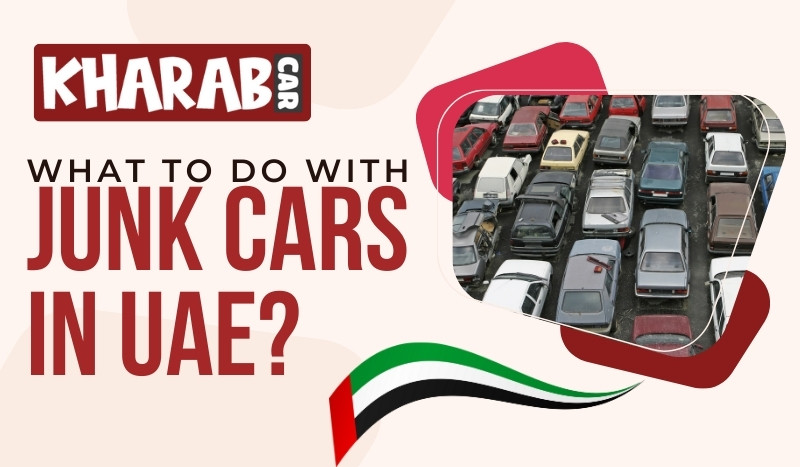- Barsha Heights - Dubai
- info@kharabcar.com
- +971 55 722 7700
What to Do with Junk Cars In UAE?

What to Do with Junk Cars In UAE?
Junk car disposal in the United Arab Emirates is a systematic procedure that entails several processes to guarantee both legal compliance and environmental sustainability. This blog will explore the lifecycle of abandoned cars, from when they are judged unfit for use on public roads until their ultimate disposal through recycling or total dismantling.
Find and Gather Junk Vehicles in the United Arab Emirates.
Finding cars that meet the criteria to be considered trash cars is the first stage in the process. Usually, these vehicles have sustained significant damage, are too old, or have several mechanical issues to be safe to drive. If the cost of repairs is more than the car's worth, owners may choose to scrap their vehicles. Additionally, abandoned cars are identified by local authorities, who also punish their owners.
Collecting
Junk cars are gathered after they are identified. Owners can get in touch with businesses that specialize in collecting and getting rid of junk cars, such as KharabCar.com. These businesses make the procedure easy for owners by frequently offering free towing and cash for an abandoned car.
Examining and Assessing
The trash car goes through a preliminary examination when it is picked up. Based on the vehicle's condition, make, model, and possibility for parts salvage, this evaluation helps in determining the car's value. The results of this inspection determine what has to happen next for the car.
The amount of metal in the car, its functional components, and the market's desire for replacement parts are all taken into account when valuing the vehicle. Businesses such as Kharabcar give the owner a reasonable amount after providing a thorough appraisal.
The Process of Dismantling and Recycling
The car is sent to a disassembly factory after it has been valued. Here, the vehicle is meticulously dismantled, with all salvageable components taken. Engines, transmissions, and electronics are examples of parts that are in good shape and are cleaned, tested and kept for future sale.
The remaining car body, which is mostly made of metal, is recycled after it has been disassembled. To transfer the car to metal recycling facilities, it must be crushed into small blocks. Important materials like steel, aluminum, and copper are recovered through recycling and melted down to be used again in the production of new goods.
Environmental Aspects to Take into Account
Hazardous elements found in junk cars, like coolant, oil, and batteries, can damage the environment if improperly disposed of. Strict rules are adhered to by the dismantling facilities in the United Arab Emirates to guarantee the safe extraction and disposal of these materials. For instance, batteries are treated to stop dangerous material leaks, and coolants and oils are emptied and recycled.
Significantly less garbage is dumped in landfills when auto parts and materials are recycled and reused. This endeavor is consistent with the UAE's pledge to lessen its carbon impact and promote environmental sustainability.
Adherence to Regulations
The UAE has strict laws governing the disposal of junk cars to make sure the procedure complies with the law and is not harmful to the environment. Before an automobile can be lawfully demolished, its owner must present proof of ownership and the Roads and Transport Authority (RTA)'s deregistration of the vehicle.
Regulatory organizations, like the RTA and regional environmental agencies, keep an eye on the car scrapping procedure to make sure that safety regulations and environmental laws are being followed. To ensure compliance, these organizations regularly examine recycling and dismantling sites.
The Convenience and Efficiency
A key component of the effective and environmentally responsible removal of unwanted cars is played by us. We provide car owners with services that simplify every step of the process, from appraisal to collection, disassembly, and recycling.
By offering a dependable and eco-friendly junk car removal service, Kharabcar advances the larger objective of sustainability in the United Arab Emirates. By ensuring that valuable resources are recovered and reused, they lessen the impact on the environment and the need for new raw materials.
Upcoming Developments and Trends
As technology advances, the auto recycling sector is always changing. The process is becoming more ecologically friendly and economical because of advancements in recycling techniques and equipment breakdown.
The business is adjusting to new obstacles as electric vehicles (EVs) become more popular, like recycling lithium-ion batteries. To ensure that EVs are disposed of appropriately, specialized recycling facilities are being built to handle the special components of these vehicles.
Conclusion
The voyage of a junk car in the United Arab Emirates demonstrates the nation's dedication to environmental preservation and sustainability. Every stage, from early resource recovery and identification to disassembly, recycling, and adhering to stringent standards, is planned to reduce environmental effects and optimize resource recovery. Leading businesses in this sector, offer vital services that help both drivers and the environment.
Owners can ethically dispose of their used cars by knowing what happens to cars that are garbage. In addition to ensuring environmental sustainability, the organized procedure boosts the economy by generating income from recycled materials and jobs. In line with global sustainability goals, trash vehicle recycling in the United Arab Emirates appears to have a bright future as long as the business keeps innovating and adapting to new difficulties.
